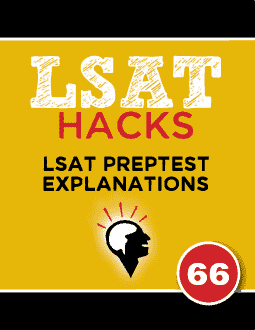QUESTION TEXT: In the last year, biologists have learned that there…
QUESTION TYPE: Flawed Reasoning
CONCLUSION: It is wrong to say that pollution is killing amphibians.
REASONING: We just discovered many more amphibians.
ANALYSIS: When we ‘discover’ a new amphibian species, we don’t create them out of thin air. The frogs were already there, we just noticed them for the first time.
So it’s quite possible that species are dying. It doesn’t matter if we find species we had previously missed. Discovering more frog species has no effect on whether species are dying.
This is the difference between reality and our knowledge of reality.
___________
- This is a different distinction. It’s like the difference between ‘presidents of the USA’ and ‘George Washington, Abraham Lincoln…etc’
- This is a totally different thing. There’s no conditional logic in this question.
- This is a totally different thing. The question didn’t talk about cause and effect.
- This is a totally different thing. The argument didn’t mention a correlation. That’s where two things change in the same direction.
- CORRECT. We have better knowledge of amphibians. That doesn’t have any effect on their survival.


Can you address why the correct answer refers to our knowledge of amphibians as our knowledge of objects? By definition an object is not alive. I’ve noticed the LSAT gives strange answers as this one that fit the mold almost perfectly but then goes and uses words like “objects” to describe a non-object. It would be illogical to say that this is a logical criticism. By POE yes it looks better than most, but the answer is nonetheless illogical.
Check out this entry for “object” in Merriam-Webster:
https://www.merriam-webster.com/dictionary/object
The very first definition is “something material that may be perceived by the senses.” Amphibians do fall into that category. Sure, we often don’t refer to animals as objects in everyday usage, but the LSAC’s use of “object” here (as evidenced by this dictionary entry) is actually not obscure or “illogical”.
You’ll likely find this to be the case at least a few times in your prep. You’ll encounter a word that seems to be used in a way that it isn’t normally used. That’s why it’s handy to have a dictionary on hand during your prep. If the word is used in an arcane way, then you’ll become more familiar with that usage (also the active process of looking it up in the dictionary will help you retain this new information). You might also discover, as in this case, that LSAC is actually just using the word in a way that’s in accordance with its primary definition — and looking it up will enhance your understanding of the word and might even help you on future tests.
True, yet they seem to know the difference between the common definitions of object and subject quite well based on RC passages and LR stimuli that require corresponding correct answers to the definition I was initially referring to. –My point was that if a test taker uses any scientific instinctive knowledge, knowing well the difference of object and subject, it would make the correct response above illogical. Yes, this response doesn’t require any science knowledge and I think that was the biggest takeaway for me. Thanks for the dictionary tip though!
It’s not that LSAC doesn’t know the common definitions of these words, or hasn’t used them before on prior tests — it’s that occasionally you’ll see these words being used on the test in ways that are seemingly rare, but actually are in accordance with the primary or secondary definition of a word. This is likely a way that LSAC is intentionally trying to trip test-takers up.
Having a scientific background is a great asset, but it’s important to check one’s instinctive sense of what certain words must mean on the test because a.) sometimes LSAC will try to trip test-takers up by playing on that instinct and b.) the test requires an open-mindedness to words being used in ways that we don’t normally see them being used.